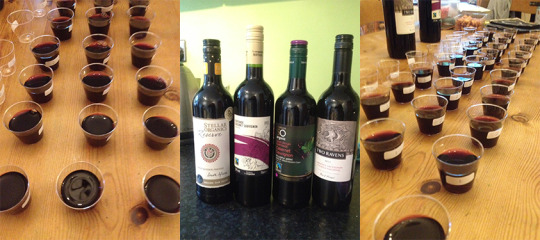
Last week I decided to test the theory that Fairtrade wine isn’t as good as non-Fairtrade. So I bought four bottles of Cabernet Sauvignon.
– Vintage Roots – Protea Reserve Organic, Fairtrade – £8.99
– Sainsbury’s Organic, Fairtrade, no added Sulphur – £6.50
– Co-op Fairtrade – £6.99
– Two Raven (non Fairtrade) – £6.99
The testers
I meet up every other week with a lovely bunch of ladies from my church and they didn’t take much persuading to be my wine guinea-pigs! The test was pretty simple, four shot glasses (yep it was pretty classy!) of numbered wine, vote for your favourite and your worst.

The results
So before I get to results it worth saying that few of us loved any of the wine but that probably means we should steer away from Cabernet Sauvignon rather than all Fairtrade wine. By far the least popular was Sainsbury’s Fairtrade, Organic, Sulphur free offering, this made us all wonder whether we’ve all got taste-buds which favour sulphur?! Maybe that’s a whole other blog but if you’re interested in the Sulphur debate check this out.
The winner was Vintage Roots, they are an online organic wine company. I’m going to talk a little more about them next week when I round up, but the bottle we had was Ethical Consumer Magazine’s ‘Best Buy’ and it seems most of my ladies agreed.
So what did this week tell me?
Well I don’t think I’m totally ready to write off Fairtrade wine, I realise the bottle that won was the most expensive. This possible goes to show that the ‘sweet spot’ theory is right, the people at Naked Wine put it like this;
‘When it comes to wine, a small step in price = a HUGE leap in quality and taste
By spending £8-£10 for a bottle of wine, you’re actually getting more than DOUBLE the quality of wine than a £6-£7 bottle …pretty impressive huh?
Sound too good to be true? It’s not. Here’s how it works…
As the price of a bottle increases, more of your money goes towards the delicious juice in the bottle rather than tax, duty and other boring stuff that adds nothing to the taste.’
I think there’s really something to be said for shopping around and trying a few Fairtrade wines to find something that will equal it’s less-ethical brothers and sister in your own personal taste test. Maybe shelling out a little more to get quality in the knowledge that the wine-maker is getting a fairer deal. Co-op have some on offer this week if you want to start your own quest!
The final thing I learnt was if you don’t particularly like red wine you don’t make the best wine taster, I think I’ll probably stick to the organic beer!

